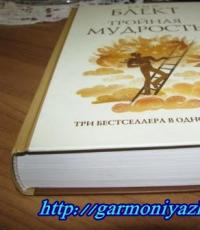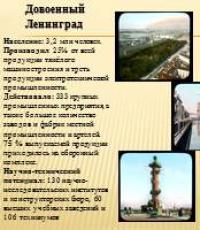Hotel business and tourism training universities. Features of training in the restaurant business. Study abroad
A person who regulates the operation of a coffee shop, restaurant, fast food chain, or other establishments in the food and restaurant industry. His work is connected with all aspects of customer service: he must create the atmosphere of the establishment, regulate the work of all employees, and monitor the quality of services. A restaurateur is the soul of any establishment; in fact, he is responsible for the impression left on a restaurant visitor; if he succeeds, then it brings a good profit.
Personal qualities
A restaurateur can manage both a restaurant and a bar, a confectionery shop, a snack bar and a fast food chain. Moreover, in all cases, he must have an impeccable understanding of accounting, legal matters, the quality of food and drinks, service, design of the establishment - organizing the entire enterprise.
The profession of a restaurateur involves long working hours, which requires stamina, and ingenuity will come in handy in difficult and controversial situations, sometimes arising when working with visitors and staff. Determination, ability for languages and organizational activities will help in your career. However, the most important thing is the desire to gain knowledge about all levels of restaurant work.
Where to study for this profession
The profession involves working in the field of nutrition and management, so you can graduate from both a university and a secondary educational institution with the prospect of immediately entering the third year of the institute. You can graduate from a university, college, continue your studies as a restaurateur at a university after secondary education, or complete restaurateur courses. Each of these paths has its own specifics. A restaurateur course can be completed by a person without even a specialized education; the main thing is the desire to develop in the restaurant industry.
Each university has undergraduate programs (4 years of study full-time and 5 years for part-time), as well as master's degree - 2 years.
Training to become a restaurateur at a university:
Moscow
Faculty: Economics and management of hotel enterprises
Passing score: 269
- Russian New University
Faculty: Hospitality
Entrance exams (USE): social studies, Russian language, foreign language
Passing score: 204
- Russian State Social University
Faculty: Hospitality
Entrance exams (USE): social studies, Russian language, foreign language
Passing score: 156
Saint Petersburg
- St. Petersburg State University service and economics (SPbGUSE)
Faculties: “Economics and management of service enterprises”, “Trade and restaurant business”
Entrance exams (USE): social studies, Russian language, foreign language
Passing score: 256
- National Association of Hotels and Restaurants "Academy of Hospitality"
Faculties: Hospitality, Service
Entrance exams (USE): social studies, Russian language, foreign language
Passing score: 210
Pros and cons of the profession
The advantages of the profession include: interesting job, space to implement your own ideas, high salary.
Cons: work as a way of life - almost no days off and rationed vacation, stressful atmosphere.
Career. Places of employment
A restaurateur may be required in various types of establishments: a restaurant, a chain of pizzerias, a coffee shop, a wine restaurant, even a bar and a children's cafe.
Among them may be:
Restaurant "Metropol"
Pizzeria "Papa John's"
Coffee chain "Starbucks"
Bar-club “Chinese Pilot Zhao Da”
Related professions
A restaurateur is a broad profession, but it differs in many ways from its adjacent ones. For example, from the profession of a cook, he regulates the quality of dishes and their taste, composes and participates in creating the menu together with him, and the cook directly embodies this plan. The difference from the administrator is that the restaurateur is more deeply aware of his establishment, has an understanding of all aspects of the life of the enterprise, and the administrator only shares part of his management responsibilities.
Since the profession requires good knowledge of the restaurant business, you should think about practice and work from the first years of study. Exist educational programs, which will help bring such a plan to life (correspondence and part-time forms). In practice, restaurateurs become either entrepreneurs or people who have climbed the career ladder from chef to restaurateur and know their business very well.
300 hours 23500
4.1 Hotel classification
12. Basics of hotel management
18. Hotel staff selection
18.3 Leadership styles
Apply for training and get free access right now to a demo lesson on 11 secrets from successful hoteliers to increase hotel sales!
A profession in the hotel business is promising and relevant
The tourism business in Russia and around the world, despite certain economic instability, is actively developing these days, and this mainly contributes to the emergence of hotels of different levels and quality of service. Unfortunately, not all hotel owners understand how important it is for the hotel’s reputation to be able to professionally and competently manage the hotel’s departments and services. To do this, it is necessary not only to have an idea of successful examples of management of well-known hotel chains and the structure of hotel services, but also to have a detailed understanding of quality standards, personnel requirements and additional services that the hotel can provide.
The position of a hotelier is the highest level career ladder in the hotel business, it requires high competence and comes with extreme responsibility. Only a true professional with appropriate education in this field can occupy such a high position. And you can get such education in the hotel business through courses International Academy Business.
Full course program "Hospitality" specifically for hotel managers
Especially for managers of hotel industry enterprises, the International Academy of Business has developed an effective training program in the hotel business.
The Hospitality program at the International Academy of Business is aimed both at training “from scratch” and at improving the skills of hotel or hotel managers.
The International Academy of Business uses modern approaches and technology in education. Long gone are the days when you had to attend classes at designated times and waste time on the road. To study at the International Academy of Business, it is enough to have access to the Internet to obtain the necessary knowledge at any time and from anywhere in the world. Try it and feel how easy and productive distance learning can be, thanks to the clear form of presentation of the material, equipped with illustrations, tables, diagrams and videos. In the process of studying hotel management and business professional specialists The academies will always be in touch with you, ready to answer all your questions. Our the main task- help you master your specialty most effectively and efficiently. Distance courses in hotel business at the International Academy of Business are high-quality educational services for your future!
Modern and promising training at the International Academy of Business
The International Academy of Business has been specializing in providing qualified training for owners, managers and employees of the tourism and hotel businesses for more than 15 years. More than 5,000 students have already entrusted their Professional Development and career growth.
After completing distance learning courses in hotel management at the International Academy of Business, graduates receive a state diploma with an international application for completion professional course"Hotel business".
License for educational activities №038379
Training course program "HOTEL BUSINESS"
1. Introduction to the subject “hotel industry”1.1 History of development and place in the economy of the hotel and tourism business
1.2 Global brands of the hotel industry and the success story of the brands Ritz-Carlton, Hilton, Kempinski, Holiday Inn, Marriott
2. Hospitality industry in the 21st century
2.1 Structure and development factors of the hospitality industry
2.2 Seasonality and the current state of the hospitality industry
2.3 Basic models of hospitality and hotel business organization
2.4 Classification and specifics of hotel services and hotel products
3. Classification and structure of hotel enterprises
3.1 Classification of hotels in different countries by category, category, level of comfort
3.2 Types of hotels and functional purposes of hotels
3.3 Requirements for hotels of different levels and life support
4. Features of the development of the domestic hotel industry
4.1 Hotel classification
4.2 Hotel management system and hotel chains in Russia
4.3 Hotel industry system in Moscow and St. Petersburg
5. Main features of services hotel company
5.1 Hotel services and their functions. Interaction between hotels and travel agencies
5.2 Operating methods and room reservation systems. Reception service structure
5.3 Structure of the hotel’s engineering, technical and administrative services
5.4 Security service structure and job descriptions of hotel staff
6. Theoretical basis international standards hotel services
6.1 Concept of quality service standard and application of service standards as a success factor
6.2 Appearance and rules of behavior of hotel staff
6.3 Standard telephone conversation. Procedure for booking, registration, check-out
7. Basic requirements for employees of hotel enterprises
7.1 Compliance with professional ethics and personal qualities for working in a hotel
7.2 Factors influencing a guest’s choice of hotel
7.3 The most common types of customer behavior and rules for communication between hotel staff and guests
7.4 Basic principles for successfully dealing with difficult guests and ways to resolve complaints
8. Organization and basic principles of operation of the hotel restaurant complex
8.1 Hotel restaurant system and waiter work standards
8.2 Advantages and disadvantages of outsourcing in the hotel business
8.3 Room-service and compliment system for hotel guests
8.4 Rules for document flow, accounting for restaurant service dishes and minibar products
9. System of additional hotel services
9.1 Services for booking tickets, transfers and organizing excursions at the hotel
9.2 Typology, types and functions of hotel animation services and programs
9.3 Catering for tourists in hotels
10. Licensing and certification of hotel business
10.1 Definition of standardization, hotel standards and licensing
10.2 Indicators of the quality of hotel services
10.3 Confirmation of hotel compliance with international requirements (certification) and international certification
11. Role and economic importance competition in the tourism market
11.1 Effective management of the hotel business. Formation and key factors of competitiveness
11.2 Types and basic strategies of competition in the hotel services market
12. Basics of hotel management
12.1 Classification of forms of hotel management: contract, franchising, rent, joint stock companies, syndicates, consortia
12.2 Structure and methodology of hotel enterprise management. Quality management
12.3 Leadership and motivation of hotel employees
12.4 Methods and functions of planning, management functions
13. Management decisions and procedures and developments
13.1 Types and conditions of effectiveness management decisions
13.2 Process, decision-making styles and approach to decision-making
13.3 Organizational plan and control over the execution of decisions
14. Financial management hotel enterprises
14.1 Economic planning and analysis financial condition hotel company
14.2 Components of a hotel product and calculation of the cost of hotel services
14.3 Revenue management of a hotel enterprise, accounting and reporting
14.4 Indicators for assessing the movement and condition of the hotel’s fixed and working capital
15. Drawing up a business plan for opening a hotel
15.1 Drawing up a business plan, budgeting and costing
15.2 Interactions of hotel management systems
15.3 The process of preparing for the expansion of a hotel chain
16. Marketing management in the hotel business
16.1 Main reservation systems
16.2 Cyclicality in the marketing of hotel services. The need to monitor competitors and action plan
16.3 Internet promotion and program organization
17. Security and security system
17.1 Integrated security and fire protection system
17.2 Security concept for a modern hotel
18. Hotel staff selection
18.1 Features of hiring staff in a hotel, rules for conducting surveys and interviews
18.2 Features of personnel selection for linear and leadership positions, leadership qualities and organizational skills
18.3 Leadership styles
19. Professional development of hotel employees
19.1 Training, internship and professional adaptation of new employees
19.2 Evaluation of the performance of hotel employees
19.3 Conducting trainings and certification of hotel staff
20. Hotel personnel management
20.1 Forms and methods of personnel management, staffing
20.2 Conclusion rules employment contracts and wages
20.3 Fund formation and accrual wages
21. Basics of taxation of a hotel enterprise
21.1 System of taxes and fees, VAT calculation
21.2 What are the taxes on the net profit of an enterprise and on the cost of production?
21.3 Features of hotel taxation and income tax
The course “Hospitality” of the International Academy of Business will teach you to understand the trends of the hotel business, tell you about the nuances of the services provided by the hotel, and introduce you to the standards in the hotel industry. You will learn all the intricacies of management in the hospitality industry. You no longer need to look for where to study hotel business and hotel management - the most effective correspondence training in hotel business is at the hotelier school courses at the International Academy of Business. Apply for the Hospitality course now and in just a few weeks of study you will acquire all the necessary knowledge to effectively manage a hotel business and master the profession of a hotelier!
Submit your application for training right now and get absolutely free access to the first lesson, where we will tell you 11 secrets from successful hoteliers for increasing sales of hotel services!
Leading specialists in the hotel business are confident that in the coming years the profession of a hotelier, already popular abroad, will become one of the most in demand in Russia. This is not surprising, because the position of a hotelier is a consistently high salary and a prestigious profession!
That is why the requirements for a hotelier are especially high... For successful work, it is not enough to have clear knowledge of theory and practical skills; you also need to be able to manage staff well, understand the legislation, and analyze offers and market needs.
You will be able to fully master the key skills and knowledge for success in the hotel business as soon as you complete the “Hotelier” course at the Institute of Hotel Business at the MBA CITY Business Academy!
The complete “Hotelier” course, developed by the best hotel business specialists specifically for your training, takes into account every useful detail: from job descriptions for hotel staff to the ability to understand the taxation system. These fundamental, as well as many other disciplines and knowledge important for success, will become indispensable both for the success of your business and for increasing your personal professional competence.
Students of the “Hotelier” course at the school of hoteliers at the MBA CITY Business Academy will effectively and quickly receive a high-quality education in the hotel business, become familiar with the specifics of hotel services, become familiar with the classification and categories of hotels, reception and accommodation services. You will learn the skills fundamental to a successful hotelier, become familiar with key service standards and learn the principles of evaluating the performance of hotel staff.
The general course of hotel business “Hotelier” at the Moscow Institute of Hotel Business MBA “CITY” is your real chance to study in hotel business, receive a diploma in hotel business and get closer to the world of successful hoteliers!
In order for you to gain knowledge in the profession of “Hotelier” in the most comfortable way, the Institute of Hotel Business invites you to choose personal form training:
● Distance learning . A distance course at the Institute of Hotel Business from the MBA CITY Business Academy is the most convenient form for those who want to become a successful hotelier in the shortest possible time. The course program contains complete and up-to-date information sufficient for successful management of the hotel business. . Future hoteliers, during their correspondence education in the hotel business, get acquainted with valuable text lessons, supported by tables, graphs, diagrams, audio and video, dedicated to the keys for a successful hotelier professional knowledge and skills. Thanks to a clear and detailed multimedia presentation of the material, you can effectively master the knowledge on your own. Distance general course vocational training“Hotelier” from the MBA CITY Business Academy - your opportunity to master the training program in a quality manner and the shortest possible time become a professional in the hotel business!
● Full-time distance learning in a group. Combine business with pleasure by choosing this type gaining knowledge. IN effective program course “Hotelier” at the Institute of Hotel Business at the Business Academy MBA CITY You will attend full-time training courses in the hotel business. Classes take place in our training center, in specially equipped and comfortable classrooms. You will be effectively introduced to the material during practical exercises, trainings and role playing games dedicated to mastering the profession of a hotelier. The course is taught by an experienced teacher-practitioner who will share with you the professional secrets of the hotel business. Classes are held in groups of up to 10 people. For more detailed study and repetition of the material, listeners via Personal Area access to the distance learning program for the general hotel business course “Hotelier” from the MBA CITY Business Academy is also available.
● Individual/corporate full-time and distance learning. Do you value a personal approach? The most useful personal training program will be developed especially for you, which will include the disciplines that you need. A personal schedule and training course for the “Hotelier” profession, compiled on an individual request, will allow you to use your time as efficiently as possible, while also saving your money. Study the necessary disciplines remotely, at a convenient pace and rhythm. A corporate uniform will be the most useful for employees, motivating the entire team for professional and personal growth at once!
Whichever option you prefer, you can be sure: specialists from the Institute of Hotel Business from the MBA CITY Business Academy will help you learn all the basics of the fascinating and exciting world of the hotel business as quickly and with pleasure as possible.
Due to the widespread development of the hotel business, competition in this segment is especially high. In order to obtain the necessary qualifications and become part of the rapidly developing, relevant and profitable field of the hotel business, it is imperative to undergo the appropriate training.
That is why, with the help of the general hotel business course “Hotelier” from the MBA CITY Business Academy, you can become a particularly valuable specialist. Learn the art of presenting your offer in a light favorable to the consumer, learn all the secrets of doing business in the hotel industry and become indispensable!
At the end of the training, students receive a state diploma with an international supplement on advanced training in the hotel business and completing the “Hotelier” course.
License for educational activities No. 038379
HOTELIER training course program
1. History, role and global brands of the hotel industry1.1 History of hotel services
1.2 Hotel and travel business, its place and role in the economy
1.3 Major global hotel chains and brands
1.4 Brands "Ritz-Carlton", "Hilton", "Kempinski"
1.5 Brands "Holiday Inn", "Marriott", "Hyatt", "Best Western"
2. Current state and development of the hospitality industry
2.1 Definition and structure of the hospitality industry
2.2 External and internal factors in the development of the hospitality industry
2.3 Seasonality factor in the tourism business
2.4 Basic modern tendencies in the hospitality industry
2.5 Four global models of hospitality
2.6 Models of hotel business organization
2.7 Classification and specifics of hotel services
2.8 Features and structure of the hotel product
3. Classification and structure of hotel enterprises
3.1 Categorization of hotels and classification by category
3.2 Classification of hotels in different countries of the world
3.3 Classification of hotels by comfort level
3.4 Hotel typology
3.5 Functional purpose of hotels
3.6 Functional requirements for hotels
3.7 Hotel life support
4. Hotel industry Russian Federation
4.1 Features of the Russian hotel classification
4.2 Hotel industry in Russia
4.3 Famous hotel chains represented in Russia
4.4 Hotel industry in Moscow
4.5 Hotel industry in St. Petersburg
5. Characteristics of hotel services
5.1 general characteristics hotel services
5.2 Booking service practices and booking risks
5.3 Features of negotiating with representatives of travel agencies
5.4 Reception and accommodation service: role, structure, requirements, norms, calculations
5.5 Rooms maintenance and operation service
5.6 Security service: crime investigation and emergency response
5.7 Hotel engineering and technical service
5.8 Job Descriptions hotel staff
6. International standards of hotel service
6.1 Principles for assessing quality services
6.2 Service standards as a factor for successful competition
6.3 Telephone etiquette standard for hotel employees
6.4 Standard appearance hotel employees
6.5 Standard of conduct for hotel employees
6.6 The check-in, check-out and booking procedure as an important component of the guest’s experience at the hotel
7. Rules for successful staff work with clients
7.1 Professional ethics hotel workers
7.2 Necessary personal qualities to work in a hotel
7.3 4 types of clients: how to find the right approach
7.4 Considerations that guide clients when choosing a hotel
7.5 Features of contact between hotel staff and clients
7.6 Difficult guests and principles of competent work with them
7.7 Complaints in the hotel industry and how to resolve them
7.8 "Tourist racket" and legal registration complaints
8. Organization and operation of the hotel restaurant service
8.1 Infrastructure of the restaurant complex
8.2 Benefits and losses of outsourcing
8.3 Waiter procedures and standards
8.4 Organization of room-service work
8.5 Organization of document flow and accounting of restaurant service dishes
8.6 Keeping records of minibar products
8.7 Classification of incentives (compliments) for hotel guests
9. Additional hotel services and ways of providing them
9.1 Types and technologies for implementing animation programs
9.2 Resort animation
9.3 Methods of organizing meals for tourists in hotels
9.4 Provision of ticket booking services
9.5 Provision of transfer services and pick-up and drop-off services
9.6 Features of organizing excursion services for guests
10. State and hotel business: obtaining a license and certification
10.1 Licensing process hotel activities
10.2 Definition of standardization and hotel standards
10.3 Schemes and documents for hotel certification
10.4 International certification and classification of hotels
10.5 Indicators of the quality of hotel services
10.6 International directions for creating quality services
11. Success and competition in the hotel business
11.1 Determination and evaluation of hotel business efficiency
11.2 Types of competition in the hotel business
11.3 Methods of competition: how to beat competitors
11.4 Building competitiveness
12. Forms and methods of managing a hotel enterprise
12.1 Forms of hotel management: contract, franchising, rent, joint-stock companies, syndicates, consortiums
12.2 Organizational structure hotel management
12.3 Developing an individual style and management method
12.4 Planning methods and functions
12.5 Creating a favorable atmosphere to motivate employees
12.6 Management control and making adjustments
12.7 Developing leadership leadership
12.8 Quality management of hotel services
13. Making management decisions in a hotel
13.1 Content and types of management decisions
13.2 Decision making process
13.3 Decision-making methods
13.4 Individual decision-making styles
13.5 Conditions for the effectiveness of management decisions
13.6 Organization and control over the execution of decisions
14. Finance and working capital of hotel enterprises
14.1 Economic indicators of the hotel
14.2 Components of a hotel product
14.3 Work of the analytical service in the hotel
14.4 Fixed assets of a hotel enterprise
14.5 Nature and composition working capital hotels
14.6 Financial resources and profit of hotel enterprises
14.7 Estimation of the cost of hotel services
14.8 Organization of accounting at hotel enterprises
15. Business planning and hotel budgeting
15.1 Development of a business plan and its implementation
15.2 Budgeting as a technology financial planning
15.3 Purpose and implementation of controlling
15.4 Process-oriented budgeting and costing
15.5 Achieving Excellence by Eliminating Waste
15.6 Planning for production expansion
16. Marketing in the hotel business
16.1 GDS and ADS systems: meaning and benefits
16.2 Monitoring competitors and analyzing the hotel services market
16.3 Effective Internet marketing of a hotel
16.4 Formation of customer loyalty programs
16.5 Cyclicity scheme in marketing
17. Hotel security system
17.1 Creation of a unified integrated security system in the hotel
17.2 Safety concept
17.3 Creation of a fire safety system
17.4 Organization of fire alarms in a hotel
17.5 Maintaining good condition of hotel electrical systems
18. Selection and staffing of the hotel
18.1 Recruitment: concept, types, methods
18.2 Conducting surveys and interviews
18.3 Selection rules for line and management positions
18.4 Methodology for diagnosing aggressiveness and self-control
18.5 Methodology for diagnosing self-esteem and personality orientation
18.6 Detection technique leadership qualities and organizational skills
18.7 Methodology for determining leadership style
19. Training and assessment of hotel personnel
19.1 Methods and techniques for training new employees
19.2 Professional adaptation of personnel
19.3 Training and exercise programs for hotel personnel
19.4 Methods for assessing and questioning employees
19.5 Conducting certification and its methods
20. Hotel personnel management and remuneration
20.1 Principles and methods of personnel management
20.2 Basic principles of people management
20.3 Enterprise support labor resources
20.4 Conclusion of employment contracts
20.5 Arrangement and distribution of workers
20.6 Forms and systems of remuneration
20.7 Procedure for accruing funds for wages
20.8 Hotel wage fund
21. Tax system and hotel taxation
21.1 Types of taxes and fees
21.2 Taxes from the net profit of the enterprise
21.3 Value added tax
21.4 Taxes on product costs
21.5 Taxes on financial results activity of the enterprise
21.6 Features of taxation of hotel enterprises
We will call you back!
We will call you back!Fill out the form below, leaving your contact phone number or e-mail, our manager will contact you shortly. Send Enter phone or email.
Hotel business training courses
Sign up for a courseThe “Holy Trinity” of the hospitality and service industry - restaurant, tourism and hotel business - despite the crises, is in the process of active growth. And even though a Russian hotel does not always fit into the European standard and infrastructure development lags behind Western countries, educational courses will look attractive as long as the business itself is attractive to investors and potential hoteliers, promising for careerists and elite in the eyes of the public. Even in lagging behind the EU and the USA there is a plus - the absence (as yet) of wild competition.
Increase the profitability of the hotel/restaurant and the professionalism of management personnel, highlight key points will help organize and develop the hotel business hotel and restaurant business courses in Moscow. The training program is short-term, but extremely intense. In a laconic but succinct form, the topic of hospitality, the basics and nuances of hotel administration, taking into account its number of floors, restaurant and bar management, fire safety, booking procedures and other points are discussed.
Oriented hotel business courses to European standards, but with an eye on the capital and all-Russian realities. After all, no Swiss profile higher education will not prepare the manager for “collisions” with domestic regulatory authorities, difficulties with supplies that arise out of the blue, slackness of personnel and other troubles of the domestic type.
I can be and an additional trump card for applicants applying for leadership positions. After all, if for the EU a note about a specialized VO in a top manager’s resume is a common occurrence, then for the hotel staff of the Russian Federation it is rather an exception. And against the backdrop of applicants with diplomas in chemists, philologists and engineers, hotel and restaurant business courses look solid and very attractive.
But the most valuable thing that hotel business courses in Moscow offer is experience-based successful establishments practical recommendations. It is impossible to answer all hotel business questions with the help of hotel and restaurant business courses. But they lay the foundation for a hotelier’s success, set priorities in organizational and management issues, help improve the qualifications of staff, and, accordingly, the level of service and profit.
Hotel business courses in Moscow
Any business requires a good knowledge of legal aspects, entrepreneurship theory and the ability to analyze the market situation. You can get the knowledge that entrepreneurs and aspiring businessmen need in the “Hotel Business Training” course.
Today, the hotel and tourism business is one of the most well-developed, competition in this sector is high, and therefore it is necessary to maneuver competently and correctly adjust business development policies. You can learn all this and much more by signing up for training at our center!
The training program involves familiarization with the peculiarities of the structure of the administrative and economic service, legal basis and rules for maintaining documentation. In the process of studying the hotel business, you will learn how to competently organize a reservation and accommodation service and become familiar with European standards.
Classes in this course are taught by specialists who have been working in the hotel business for many years and have successfully developed their companies. They will be happy to share the secrets of success!
hotel and restaurant business courses in Moscow
Course name:
Organization and management of hotel business.
Course duration:
Total course volume:
Class schedule:
Standard training mode:
- Monday, Wednesday, Friday - 4 academic hours each.
- Tuesday, Thursday - 4 academic hours each.
- Saturday, Sunday - 4 academic hours each.
- Monday, Tuesday, Wednesday, Thursday, Friday - 4 academic hours each.
- Monday, Wednesday, Friday - 8 academic hours each.
- Tuesday, Wednesday - 8 academic hours each.
- Saturday, Sunday - 8 academic hours each.
Group lesson times for courses:
- morning - from 9-00 to 12-00, from 10-00 to 13-00
- daytime - from 12-00 to 15-00, from 13-00 to 16-00, from 15-00 to 18-00
- evening - from 18-00 to 21-00, 19-00 to 22-00
- Weekend groups: Saturday and/or Sunday - from 10-00 to 13-00, from 13-00 to 15-00, from 15-00 to 18-00.





